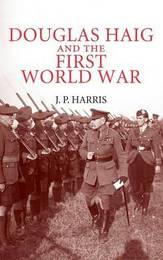
|
Douglas Haig and the First World War
Hardback
Main Details
Description
From December 1915 until the armistice of November 1918, Sir Douglas Haig was commander-in-chief of the largest army his country had ever put into the field. He has been portrayed as both an incompetent 'butcher and bungler' and a clear-sighted, imperturbable 'architect of victory'. However, in this magisterial account, J. P. Harris dispels such stereotypes. A dedicated military professional, Haig nevertheless found it difficult to adjust to the unprecedented conditions of the Western Front. His capacity to 'read' battles and broader strategic situations often proved poor and he bears much responsibility for British losses 1915-17 that were excessive in relation to the results achieved. By late 1917 his own faith in ultimate victory had become so badly shaken that he advocated a compromise peace. However, after surviving the German spring offensives of 1918, he played a vital role in the campaign that finally broke the German army.
Author Biography
J. P. Harris is a Senior Lecturer in War Studies at the Royal Military Academy, Sandhurst. His publications include Men, Ideas and Tanks (1995) and Amiens to the Armistice (1998).
Reviews'Paul Harris has not only written the definitive biography of Field Marshal Douglas Haig, but the most important book on the First World War to appear in over a decade. His judicious use of sources and impeccable research has placed Haig in the context of the terrible challenges that that terrible conflict raised. The resulting portrait presents his considerable strengths along with the fatal flaws that were to prove so disastrous in terms of the lives of British soldiers in the battles of 1916 and 1917. Above all Harris' biography underlines that it is individuals who make history, not obscure social trends.' Williamson Murray, Institute for Defense Analysis 'This is a superb book. Deftly sidestepping caricatures of Haig as either a callous, incompetent butcher or as a clear-sighted, imperturbable Great Captain, Harris offers a nuanced picture of a complex personality in hopeless times. Haig was not purblind, but open to technical and tactical innovation. Yet he was responsible for the massive casualties so disproportionate to the results achieved and for the near collapse of British civil-military relations by the end of 1917. He went from the nervous, battle-shy corps commander of Mons 1914 to the confident 'tyde-what-may' army commander of 1915-17, and to the shaken and confused soldier-statesman of 1918. Bold and masterful, this book will become the standard biography of Haig.' Holger H. Herwig, Professor of History and Canada Research Chair in the Centre for Military and Strategic Studies, University of Calgary 'Ninety years after the end of the Great War and eighty years after his death, Haig still has the capacity to arouse extraordinary extremes of vilification from his detractors and praise from his defenders. There have been many biographies of Haig over the years, but few have matched Paul Harris's mastery of both the original archive sources and also the most recent scholarship, which has so transformed our understanding of the nature of command and the conduct of operations on the Western Front. Here, then, is an informed and thoroughly modern re-assessment, balancing Haig's undoubted qualities against his manifold weaknesses.' Professor Ian F. W. Beckett, University of Northampton 'Paul Harris is one of our very finest military historians of the Great War. He combines great depth of scholarship, research - and especially of psychological perception - with a highly readable style. In this, his highest masterpiece to date, he has cut straight through a horribly tangled thornbush of pro-Haig hagiography inter-twined with anti-Haig propaganda of the 'Butchers and Bunglers' variety. His ultimate conclusion is that the anti-Haig camp has very much the right of it, although much of the hysteria attaching to this issue has been lamentably over-done. This, surely, has got to be the long verdict of History.' Paddy Griffith, author of Battle Tactics on the Western Front 1916-18 (1994)
|